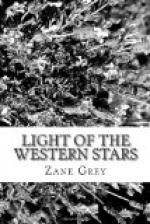“Yes!”
He had wrenched that word from her, but he was not subtle enough, not versed in the mystery of woman’s motive enough, to divine the deep significance of her reply.
For him the word had only literal meaning confirming the dishonor in which she held him. Dropping her arm, he shrank back, a strange action for the savage and crude man she judged him to be.
“But that day at Chiricahua you spoke of faith,” he burst out. “You said the greatest thing in the world was faith in human nature. You said the finest men had been those who had fallen low and had risen. You said you had faith in me! You made me have faith in myself!”
His reproach, without bitterness or scorn, was a lash to her old egoistic belief in her fairness. She had preached a beautiful principle that she had failed to live up to. She understood his rebuke, she wondered and wavered, but the affront to her pride had been too great, the tumult within her breast had been too startlingly fierce; she could not speak, the moment passed, and with it his brief, rugged splendor of simplicity.
“You think I am vile,” he said. “You think that about Bonita! And all the time I’ve been . . . I could make you ashamed—I could tell you—”
His passionate utterance ceased with a snap of his teeth. His lips set in a thin, bitter line. The agitation of his face preceded a convulsive wrestling of his shoulders. All this swift action denoted an inner combat, and it nearly overwhelmed him.
“No, no!” he panted. Was it his answer to some mighty temptation? Then, like a bent sapling released, he sprang erect. “But I’ll be the man—the dog—you think me!”
He laid hold of her arm with rude, powerful clutch. One pull drew her sliding half out of the saddle into his arms. She fell with her breast against his, not wholly free of stirrups or horse, and there she hung, utterly powerless. Maddened, writhing, she tore to release herself. All she could accomplish was to twist herself, raise herself high enough to see his face. That almost paralyzed her. Did he mean to kill her? Then he wrapped his arms around her and crushed her tighter, closer to him. She felt the pound of his heart; her own seemed to have frozen. Then he pressed his burning lips to hers. It was a long, terrible kiss. She felt him shake.
“Oh, Stewart! I—implore—you—let—me—go!” she whispered.
His white face loomed over hers. She closed her eyes. He rained kisses upon her face, but no more upon her mouth. On her closed eyes, her hair, her cheeks, her neck he pressed swift lips—lips that lost their fire and grew cold. Then he released her, and, lifting and righting her in the saddle, he still held her arm to keep her from falling.
For a moment Madeline sat on her horse with shut eyes. She dreaded the light.
“Now you can’t say you’ve never been kissed,” Stewart said. His voice seemed a long way off. “But that was coming to you, so be game. Here!”




